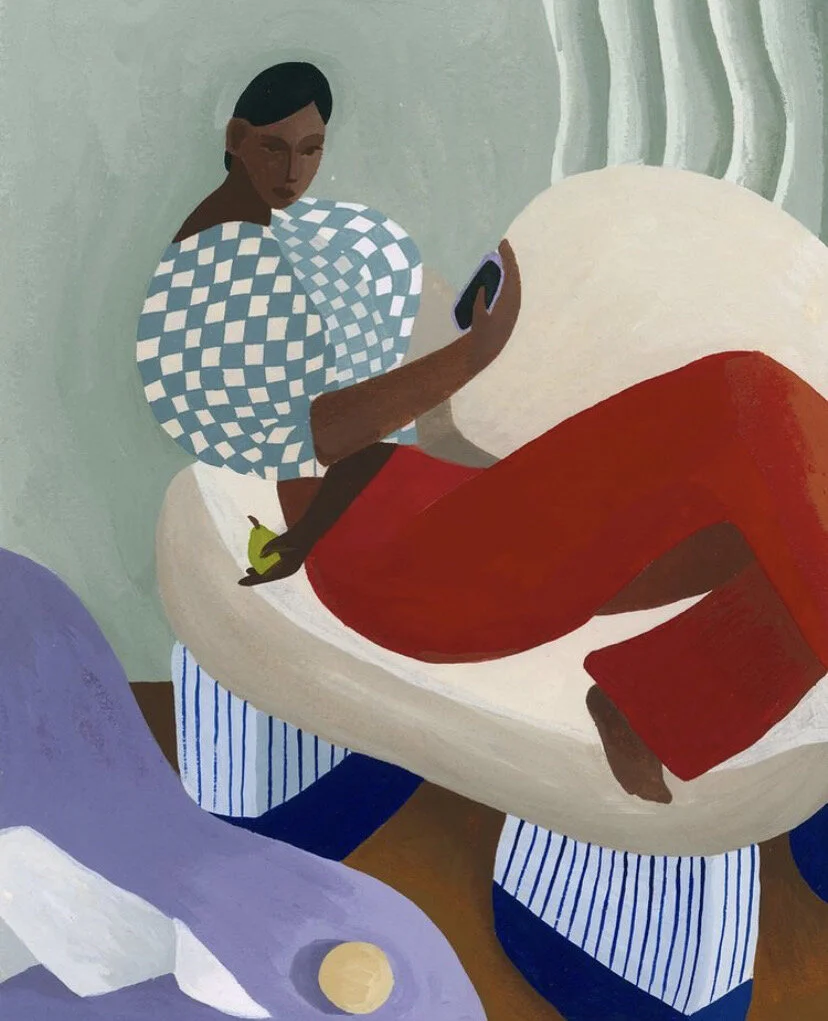The Invisible Corset of the Beauty Industry & How to Break Free
Art ℅ Nat Vico
“I’m not doing it for attention or approval, I’m doing it for me, because it makes me feel good.” That’s what many women say about their time-consuming makeup routine, detailed skincare process, or cosmetic surgery choices.
But is it really true? Are women shouldering the brunt of the $530 billion beauty industry (1), spending years of our life in the bathroom getting ready (2), and supporting a $70 billion diet industry (3) because it makes us feel good? Or have we been brainwashed into body obsession and taught to call it empowerment?
The Beauty Industry is a Psychological Abuser
As a Body Connection Coach, I help women around the world heal their relationship with food and body image. One of the first things I tell my clients is, “The beauty industry is a psychological abuser.”
The goal of a psychological abuser is not to create a relationship of mutual love and support, but to exploit your body, finances, and time. They accomplish that by dismantling your intuition and confidence, then convincing you that you must rely on them for power, safety, and love. Most importantly, they must do this without you noticing — they want to milk you for everything you’ve got, as long as they can.
Consider how the beauty industry fits that definition. First, it convinces you that the natural state of your body — undereye circles, wrinkles, cellulite, visible pores — is shameful and inadequate. Then, it deploys a barrage advertising propaganda to make you subconsciously equate beauty with love, career success, and a great sex life. The entire time, it disguises its agenda by labeling all beauty practices “self-care,” “feminist,” or “empowering.”
While we can use beauty products as a positive form of self-expression, it’s not empowering to buy our confidence back from the industry that stole it from us in the first place. True empowerment means recognizing the societal coercion and industry propaganda at play, so we can make choices that are in our best interest, rather than the best interest of the beauty industry.
The Trap of the Invisible Corset
The beauty industry takes advantage of the fact that women are wearing the invisible corset: a set of culturally-inherited beliefs that make us as uncomfortable and restricted in our bodies as whalebone corsets once did. Trapped in the invisible corset, women fear, distrust, and dominate our bodies instead of seeing them as wise beings to trust.
The invisible corset effectively divorces women from our bodies — our first and most enduring soulmates. We desperately turn to beauty products and procedures to alleviate the pain of disconnection, but this is like trying to fix a broken arm by visiting the dentist.
The invisible corset creates cultural inequity by uniquely siphoning women’s finances. It also coerces women to destroy their body’s function and integrity. Many types of cosmetic surgery, for example, would be considered animal abuse if it was done to a household pet, instead of to our bodies, because it creates unnecessary pain and suffering.
Just like Chinese mothers in prior centuries were responsible for breaking and binding their daughters’ feet, women are strapping our daughters and granddaughters into the invisible corset. The younger generation observes how adult women talk about our bodies and treat our bodies, and they learn from our example. There is nothing empowering about this generational cycle female body hate.
It's time for women stop forcing our bodies to fit societal trends, and calling it empowerment. We’ve tried it long enough. In past centuries, we’ve broken and bound our feet, cinched our waists, whitened our skin with lead, and grew our hair so long it gave us headaches. Now, we’re freezing our foreheads with neurotoxins, filling our breasts with silicone, and slathering our bodies with chemical-laden products. We’ve swallowed these painful, patriarchal values over and over, and called them our own.
Choosing Freedom
The good news is that we aren’t victims here: we are the one spending more money on beauty than our education. We are the ones who are dieting obsessively instead of eating easily and intuitively. We are the ones who are skipping beach days, family events, and career advancement opportunities because we feel insecure about our bodies. We are the ones consciously and unconsciously ourselves back because we believe our bodies aren’t good enough.
Because we are restricting ourselves, we have the power to racially free ourselves. We can invest our time and money into avenues that actually produce the relationships, success, and confidence we desire. We can stop shaming women’s natural bodies. We can learn to see our bodies as soulmates to trust, instead of machines to control.
Women can only experience the freedom of beauty when we address the restriction of it, and cast off our corsets. Then, we’ll be truly free to choose beauty practices, because we’ll feel equally free not to choose them. That’s when beauty becomes what we always wanted it to be: fun, celebratory, sensual, and self-expressive.
About the Author
Lauren Geertsen (@Body_Connection_Coach) is the author of The Invisible Corset: Break Free of Beauty Culture and Embrace Your Radiant Self and creator of the health website EmpoweredSustenance.com.



